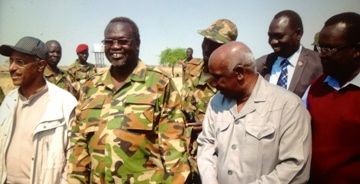South Sudan’s opposition leader Riek Machar rebuffed an appeal by international mediators to immediately sign a ceasefire deal, expressing several reservations during a face-to-face meeting yesterday.
IGAD mediators led by Ethiopian diplomat Seyoun Mesfin took an airplane to visit Riek Machar yesterday at an undisclosed location, accompanied by envoys from the United States, United Kingdom and Norway.
Both Machar and his rival President Salva Kiir have resisted for more than three weeks international pressure to declare a cessation of hostilities.
Donald Booth, the US envoy to South Sudan said, “we engaged him for over three hours in trying to move him toward a in trying to move him toward agreeing a cessation of hostilities agreement.”
Speaking to press in Addis Ababa at the venue of negotiations over the South Sudan crisis, Booth said that the ousted vice president “still had some concerns but I think we made some progress in allaying some of his concerns particularly in regard to the benefit that he would get out of a ceasefire agreement, which is basically that it is critical in order to get to the political talks to address the underlying causes of the conflict.”
“So we don’t have a ceasefire agreement signed yet but we continue to put pressure on both sides to sign the agreement and also on the government to agree to the release of the 11 senior SPLM members who remain detained in Juba.”
According to the US diplomat, Machar’s reservations included primarily the release of the 11 detainees, which he maintains as a precondition for a ceasefire, the Ugandan military intervention in South Sudan, and the question of whether a ceasefire agreement would be respected.
‘They have not reached anywhere’
Government spokesman Michael Makuei said that the delegations were briefed by the mediators after their return. “According to them they have not reached anywhere, but he gave them the green light to go ahead” with further talks.
He said Machar has no objection to signing the cessation of hostilities but only on condition of release of the 11 detainees, which Makuei called a “non-starter” saying they could only be released according to the laws of the country.
Booth, for his part, tried to downplay the deadlock: “I don’t think we’re risking a deadlock – there’s been progress in putting together a cessation of hostilities draft agreement, both parties have had input into that.”
“We think that there is still movement that’s underway and there’s certainly still pressure on both sides,” said the US diplomat.
Church, civic leaders condemn violence
Church leaders speaking at a rally at All Saint’s Episcopal Cathedral in Juba on Saturday condemned violence in South Sudan. The rally organized by the South Sudan Council of Churches was broadcast on state television. A statement read on behalf of the ecumenical body said that politicians have dragged the people into violence and called on them to turn from evil.
Civil society leaders last Wednesday likewise led a march to the parliament calling for peace and presenting a petition to parlament. They demanded an immediate ceasefire without preconditions.
File photo: Riek Machar speaks to press at his house in Juba after being ousted from the position of vice president, July 2013 (Radio Tamazuj)
Mediators including Seyoum Mesfin (L), Sudanese General Mohammed Ahmed Moustafa El Dabi (R) at an undisclosed location in South Sudan to meet former VP Riek Machar January 11, 2014 (Photo: Handout by Machar negotiators)




